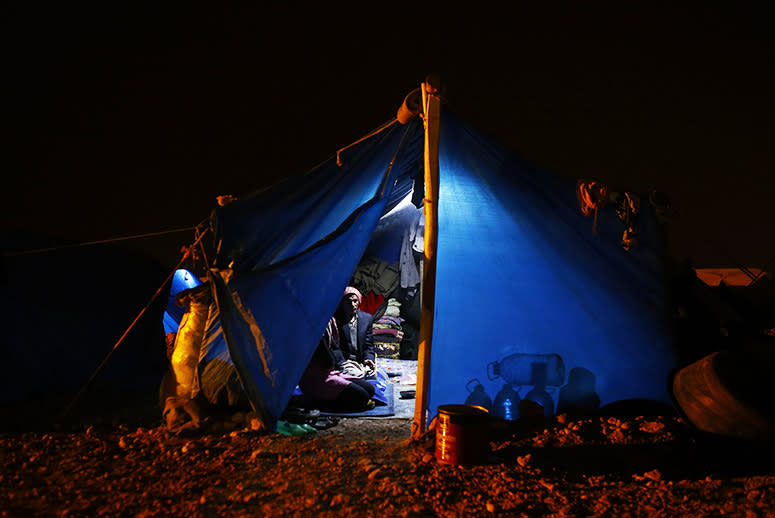On World Refugee Day, Shining a Light on a Critical but Overlooked Need at Camps

As guests filed one by one into the pitch-black main room of the Opaque restaurant in Santa Monica, California, on Thursday night—the dining experience is built around eating in the dark to heighten the senses—a palpable sense of excitement and anxiety began to fill the air.
“I’m nervous!” exclaimed one.
“My heart is racing,” remarked another.
But this was not a typical night of experimenting with a trendy restaurant concept. Instead, the guests had been gathered by Waka Waka—a Netherlands-based social venture providing solar-powered LED flashlights to communities in the developing world—for a glimpse into what life in the dark is like for the 1.2 billion people who live in energy poverty every day. One of the most vulnerable groups? Refugees.
June 20 marks World Refugee Day, and more than 59 million people are currently displaced around the world as a result of violence and persecution. That new figure is an all-time high, according to a United Nations report released this week, which saw the numbers rise from 51.2 million last year—the largest increase in a single year—and from 37.5 million just 10 years ago.
“We are witnessing a paradigm change, an unchecked slide into an era in which the scale of global forced displacement as well as the response required is now clearly dwarfing anything seen before,” U.N. High Commissioner for Refugees António Guterres said in a statement.
The report also emphasized that one in every 122 humans is now either a refugee, internally displaced, or seeking asylum, and more than half of all refugees are children.
“This is a humanitarian crisis,” Jehmu Greene, Waka Waka’s North American president, said at the Dining in the Dark event, a fund-raiser benefitting the International Rescue Committee and aimed at raising awareness about another critical need at refugee camps: light.
“When the sun sets at a refugee camp, it is not a thing of beauty,” Greene said. “The sun setting in the camps means life ends that day.”
For millions of refugees, nighttime engulfs them in total darkness and makes even the simplest tasks, such as eating or cleaning, a challenge. Young girls and women are also vulnerable to assault as they leave their tents at night or use the bathroom in the dark.
When access to light is possible, however, it’s usually in the form of kerosene lamps, which can be extremely dangerous in small, confined quarters. In fact, more than 300,000 people every year are burned, maimed, or killed by kerosene lamp fires, according to Greene, an American of Liberian descent. Her own aunt in Liberia suffered injuries from a kerosene fire shortly before she passed away.
Waka Waka was founded in 2010 by two entrepreneurs in the Netherlands who later approached Greene about helping them expand into North America. After what happened with her aunt, “they had me at hello,” she said.
Waka Waka Solar Lights have full battery power after five to 10 hours in the sun and can provide up to 80 hours of bright light. The Waka Waka Power device can charge any smartphone or small electronic device and provide up to 150 hours of light. The company’s one-for-one model also means that for every purchase made, one of its solar lights will be donated to a family in need.
To date, more than 162,000 Waka Wakas have been distributed, supporting more than 800,000 people in 41 countries. The flashlights help families feel safe and secure and their temporary dwellinngs and also allow children to work on homework assignments at night.
In fact, the solar-powered lights are such a precious commodity at refugee camps that they are the “most valued nonfood item,” Greene said, according to feedback from the IRC.
Even for guests who attended Thursday’s event, one hour in the dark was already plenty.
“I went into this dinner thinking that there was no way that we could begin to experience the discomfort of living as a displaced person without electricity. And that dinner was surreal,” said attendee and Waka Waka supporter Amanda Enayati. “It was disorienting and uncomfortable, and though it was an interesting experience, I just wanted it to be over. Afterward, I was reflecting on the dinner and thinking about how if I was that uncomfortable for just an hour one evening, how must it feel like to live like that night after night. It was certainly an exercise in empathy.”
Related stories on TakePart:
• Syrian Refugees Present Eyeballs, Get Cash
• Your Favorite Furniture Store Is Making Life Safer for Thousands of Refugees
• The Desperate Flight of Refugees Running From Boko Haram
Original article from TakePart

